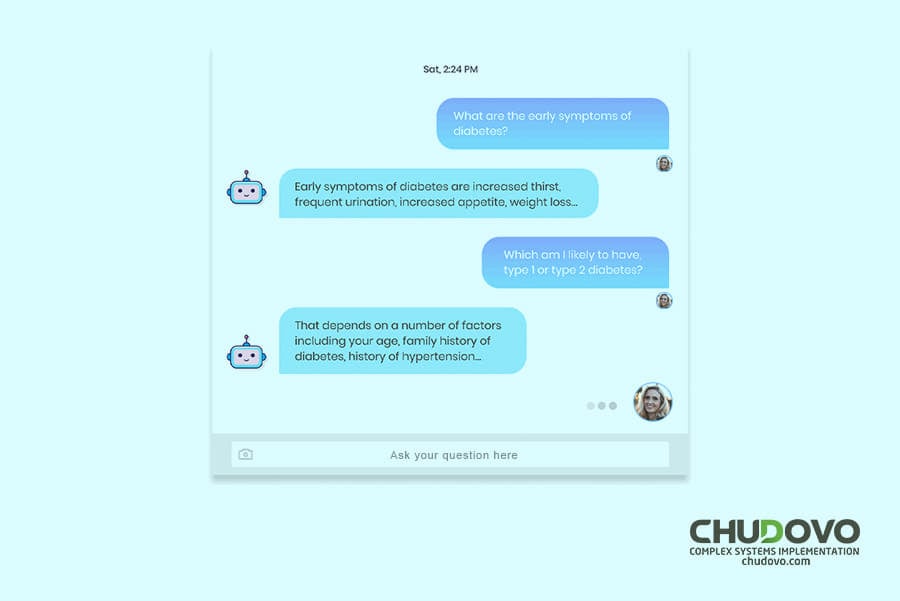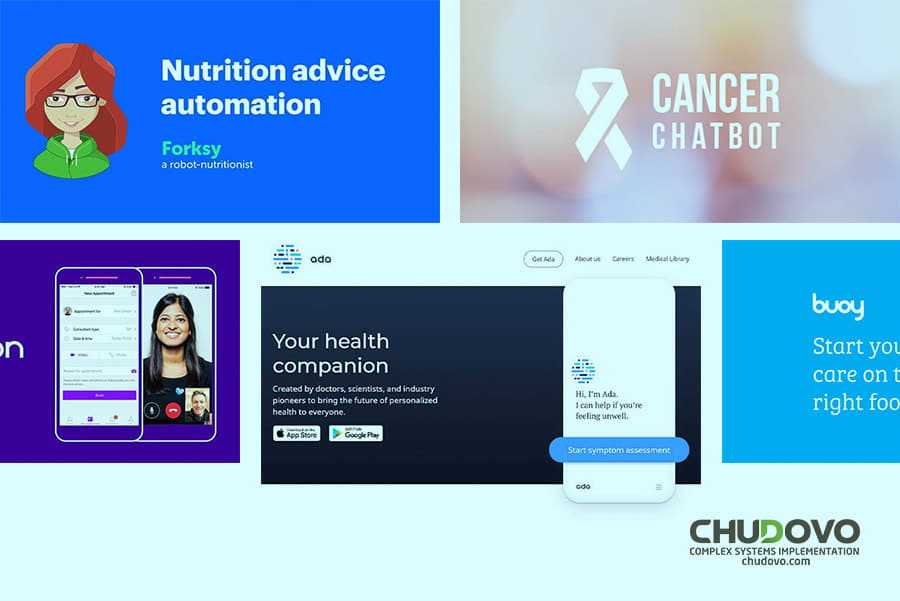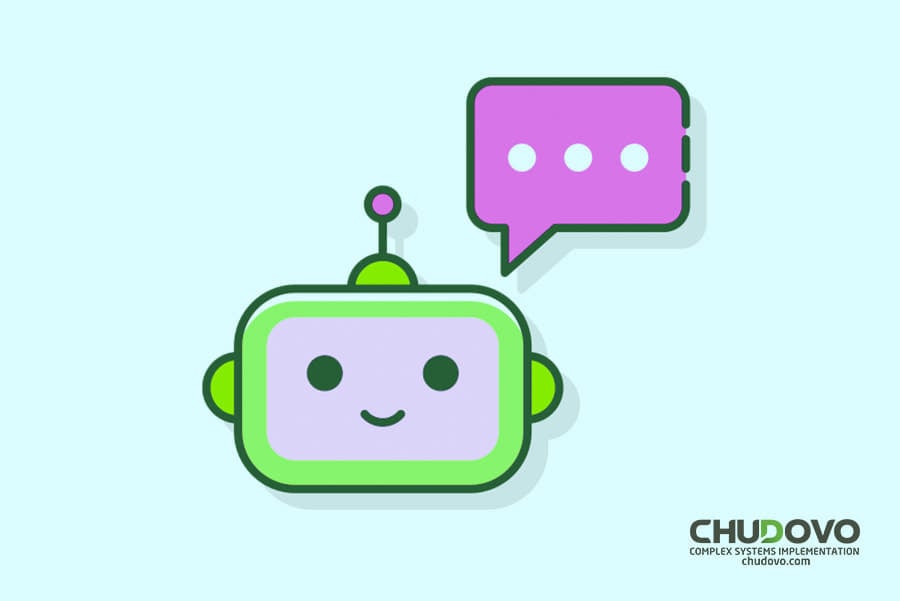The Rise of Intelligent Healthcare: Exploring the Emergence and Potential of Medical Chatbots
In the ever-evolving healthcare landscape, technological advancements continue to shape how we approach medical treatment and patient care. One such innovation that holds tremendous potential is the rise of intelligent healthcare through the emergence of medical chatbots. These conversational agents powered by artificial intelligence (AI) are revolutionizing how patients interact with healthcare providers and access medical information.
This article delves deep into medical chatbots, exploring their evolution, functionality, and diverse applications in the healthcare industry. We will also discuss the benefits and limitations of these chatbots, along with real-world case studies showcasing their success. Furthermore, we will address the challenges and ethical considerations associated with their implementation and shed light on the future directions and potential impact of medical chatbots on healthcare.
Table of content
- Evolution of Healthcare and Technology
- The Changing Landscape of Healthcare
- Technological Advancements in Healthcare
- The Role of Artificial Intelligence in Healthcare
- Understanding Medical Chatbots
- Use cases of Medical Chatbots
- Case Studies and Success Stories
- Addressing Privacy, Security, and Ethical Considerations
- Challenges and Future Directions
- Conclusion
- FAQs

Evolution of Healthcare and Technology
1.The Changing Landscape of Healthcare
The healthcare industry has undergone significant transformations over the years, driven by technological advancements and shifting paradigms in patient care. Traditional models of healthcare delivery, characterized by fragmented and episodic care, have given way to more patient-centered and holistic approaches. The focus has shifted from treating diseases to promoting preventive care, early detection, and proactive health management.
Moreover, the rise of chronic diseases, an aging population, and increasing healthcare costs have necessitated innovative solutions to meet the growing demand for quality care. Healthcare providers struggle to deliver efficient, cost-effective services while ensuring positive patient outcomes. Technology has emerged as a change catalyst in this context, revolutionizing how healthcare is delivered, accessed, and experienced.
2.Technological Advancements in Healthcare
Advancements in technology have played a pivotal role in shaping the healthcare landscape. From electronic health records (EHRs) to telemedicine, wearable devices, to precision medicine, technology has enabled healthcare professionals to make more informed decisions, streamline processes, and improve patient outcomes. Key technological advancements that have transformed healthcare in recent times include:
Electronic Health Records (EHRs)
The widespread adoption of Electronic Health Records has revolutionized how patient information is stored, managed, and shared. EHR systems allow healthcare providers to securely and efficiently access comprehensive patient data, including medical history, medications, allergies, and lab results. This seamless exchange of information improves care coordination, reduces medical errors, and enhances the continuity of care across different healthcare settings.
Telemedicine and Remote Monitoring
Telemedicine, fueled by advancements in communication technology, has emerged as a powerful tool in expanding access to healthcare services. Through video consultations and remote monitoring, patients can receive medical advice, follow-up care, and chronic disease management without needing in-person visits. Telemedicine has been particularly valuable for individuals in rural or underserved areas, allowing them to overcome geographical barriers and receive timely care.
Wearable Devices and Health Sensors
The proliferation of wearable devices, such as smartwatches and fitness trackers, has enabled individuals to monitor their health and wellness in real time. These devices can track vital signs, physical activity, and sleep patterns and detect abnormalities. By empowering individuals to take a proactive role in their health, wearable devices promote self-awareness, encourage healthy behaviors, and provide valuable data for healthcare providers to personalize care plans.
3.The Role of Artificial Intelligence in Healthcare
Artificial Intelligence (AI) has emerged as a game-changer in the healthcare industry, revolutionizing various aspects of patient care, research, and healthcare management. AI algorithms can process vast amounts of data, identify patterns, and generate insights that support clinical decision-making. Key areas where AI is making a significant impact in healthcare include:
Medical Imaging and Diagnostics
AI-powered image recognition and pattern analysis algorithms have improved the accuracy and efficiency of medical imaging diagnostics. Machine learning models can analyze medical images, such as X-rays, CT scans, and MRIs, to detect abnormalities, assist in early diagnosis, and support radiologists in their decision-making process. AI algorithms have shown promising results in detecting various conditions, including cancer, cardiovascular diseases, and neurological disorders.
Natural Language Processing and Conversational AI
Natural Language Processing (NLP) and conversational AI technologies are transforming the way healthcare professionals and patients interact and communicate. NLP algorithms enable computers to understand and interpret human language, facilitating seamless communication between individuals and healthcare systems. Conversational AI, powered by NLP, allows for intelligent virtual assistants and chatbots that can engage in human-like conversations, understand user queries, and provide relevant information and support.
These AI-powered chatbots have become increasingly sophisticated in their ability to understand the context, intent, and nuances of human language. They can assist with a wide range of healthcare-related tasks, such as symptom assessment, medication management, appointment scheduling, and general health inquiries. By leveraging conversational AI, healthcare organizations can enhance patient engagement, improve access to care, and streamline administrative processes.
Data Analytics and Predictive Modeling
The vast amount of data generated in healthcare, often called big data, presents both opportunities and challenges. AI algorithms, particularly those based on machine learning and predictive modeling, can analyze complex datasets to identify patterns, trends, and predictive insights. These insights can inform decision-making processes, enable early detection of diseases, and support population health management initiatives.
By analyzing patient data, AI can help healthcare providers identify high-risk individuals, predict disease progression, and optimize treatment plans. Additionally, AI algorithms can contribute to clinical research by identifying potential therapeutic targets, facilitating drug discovery, and improving clinical trial design.
Our healthcare & life sciences software solutions offer some of these technologies as a service. You can follow these links to learn more about our AI healthcare solutions.

Understanding Medical Chatbots
Definition and Types of Medical Chatbots
Medical chatbots can be defined as AI-powered conversational agents that engage in interactive dialogues with users to provide healthcare-related information, support, and guidance. There are primarily two types of medical chatbots: rule-based chatbots and AI-driven chatbots.
Rule-based chatbots follow a predefined set of rules and responses, while AI-driven chatbots leverage machine learning algorithms to learn from data and improve their performance over time.
How Medical Chatbots Work
To understand how medical chatbots work, let’s explore a step-by-step guide:
Step 1: User Interaction
- The user initiates a conversation with the medical chatbot through a web interface, mobile app, or messaging platform.
- The chatbot welcomes the user and prompts them to provide information or ask questions about their health concern.
Step 2: Natural Language Processing (NLP)
- The chatbot utilizes natural language processing algorithms to analyze and understand the user’s query or statement.
- NLP helps the chatbot to extract important keywords, identify the user’s intent, and comprehend the context of the conversation.
Step 3: Intent Recognition and Entity Extraction
- Based on the user’s input, the chatbot identifies the user’s intent, such as seeking symptom assessment, medication information, or appointment scheduling.
- The chatbot also performs entity extraction to identify specific information within the user’s query, such as symptoms, medications, or medical history.
Step 4: Accessing Medical Knowledge
- The chatbot accesses a vast repository of medical knowledge, including clinical guidelines, treatment protocols, and relevant medical literature.
- By leveraging this knowledge base, the chatbot can provide accurate and evidence-based information to the user.
Step 5: Generating Responses
- The chatbot generates a response tailored to the user’s query using the identified intent, extracted entities, and medical knowledge.
- The response can include information, advice, recommendations, or instructions regarding the user’s health concern.
Step 6: Dialogue Management
- The chatbot employs dialogue management techniques to maintain a coherent and meaningful conversation.
- It can handle follow-up questions, clarify ambiguous queries, and provide appropriate responses based on the context of the ongoing conversation.
Step 7: Continuous Learning and Improvement
- Medical chatbots can employ machine learning algorithms to continuously improve their performance.
- They learn from user interactions, feedback, and data analysis to enhance their understanding, accuracy, and responsiveness over time.

Benefits of Medical Chatbots:
- 24/7 Availability: Medical chatbots can provide round-the-clock support and information, ensuring users can access healthcare assistance anytime.
- Enhanced Efficiency: Chatbots can handle a large volume of queries simultaneously, reducing the burden on healthcare providers and minimizing user waiting times.
- Personalized Interactions: By leveraging user data and contextual information, medical chatbots can deliver personalized responses and recommendations tailored to individual needs.
- Improved Accessibility: Chatbots can bridge the gap in healthcare accessibility, reaching individuals in remote or underserved areas with limited access to healthcare facilities.
- Patient Empowerment: Medical chatbots empower individuals to take control of their health by providing information, resources, and tools for self-management.
Limitations of Medical Chatbots:
- Limited Diagnostic Accuracy: While chatbots can provide general information and support, they may not always accurately diagnose complex or rare medical conditions.
- Lack of Human Touch: Medical chatbots, being automated systems, lack the empathetic and emotional connection that comes with face-to-face interactions with healthcare professionals. Some users may prefer the reassurance and comfort of speaking to a human healthcare provider.
- Language and Communication Barriers: Chatbots may face challenges understanding and interpreting complex or ambiguous user queries, especially if they involve nuanced language, slang, or cultural references. Language barriers can hinder effective communication, particularly in multicultural or multilingual contexts.
- Data Privacy and Security: Medical chatbots handle sensitive personal health information, which raises concerns about data privacy and security. Implementing robust safeguards and complying with regulations such as the Health Insurance Portability and Accountability Act (HIPAA) to protect user confidentiality is essential.
- Technical Limitations: Chatbots may encounter technical limitations, such as system errors, disruptions in connectivity, or limitations in their ability to handle complex medical scenarios. These limitations can impact the reliability and effectiveness of the chatbot in delivering accurate and appropriate responses.
Despite these limitations, medical chatbots have the potential to augment healthcare services, improve access to information, and enhance patient experiences. As technology advances and AI algorithms become more sophisticated, these limitations can be addressed, allowing medical chatbots to play an even more significant role in the healthcare ecosystem.

Use cases of Medical Chatbots
Medical chatbots have a wide range of applications in healthcare, revolutionizing the way patients access information, receive support, and manage their health. Let’s explore some of the key areas where medical chatbots are being utilized:
Symptom Assessment and Triage
Medical chatbots can assist users in assessing their symptoms and determining the appropriate level of care. Users can describe their symptoms to the chatbot, which uses natural language processing algorithms to analyze the input and provide initial recommendations. The chatbot may ask follow-up questions to gather more information and offer guidance on whether self-care, a visit to a primary care physician, or urgent medical attention is necessary.
This application of medical chatbots is particularly beneficial when individuals may be unsure about the severity of their symptoms or need immediate advice when healthcare providers are not readily available. Chatbots can help users make informed decisions about their healthcare needs by providing reliable and timely information.
Medication Management and Adherence
Managing medication regimens can be complex and challenging for many individuals. Medical chatbots can serve as personal assistants in medication management, reminding users to take their medications on time, providing information about dosage and potential side effects, and answering medication-related questions.
Chatbots can also help improve medication adherence by sending regular reminders, tracking medication usage, and offering support and education regarding the importance of following prescribed medication regimens. By promoting medication adherence, chatbots can contribute to better health outcomes and reduce the risk of complications.
Mental Health Support
Mental health is critical to overall well-being, and medical chatbots are increasingly used to support this area. Chatbots can engage in conversations about mental health concerns, offering empathetic listening, guidance, and coping strategies.
Users can discuss their emotions, stressors, and challenges with the chatbot, which can provide information about mental health conditions, self-care techniques, and resources for seeking professional help. Chatbots can also monitor mood patterns and provide personalized interventions, such as relaxation exercises or mindfulness techniques, to promote mental well-being.
Chronic Disease Management
For individuals with chronic diseases, managing their condition on a day-to-day basis can be overwhelming. Medical chatbots can play a vital role in supporting individuals with chronic diseases by providing education, tracking symptoms, offering lifestyle recommendations, and assisting with medication adherence.
Chatbots can remind users to monitor their vital signs, track their blood sugar levels, or engage in regular physical activity. They can also provide personalized recommendations for managing specific conditions, such as dietary guidelines for diabetes or breathing exercises for asthma. By empowering individuals to take an active role in their care, chatbots can help improve quality of life and overall health outcomes.
Virtual Health Assistants
Virtual health assistants powered by medical chatbots offer a convenient and accessible way for individuals to access healthcare information and services. These virtual assistants can answer general health questions, guide users through symptom assessment, offer first-aid advice, and assist in finding healthcare providers or scheduling appointments.
Virtual health assistants can also provide educational content on various health topics, such as preventive care, healthy lifestyle choices, and common medical procedures. By delivering accurate and relevant information, virtual health assistants empower individuals to make informed decisions about their health and navigate the healthcare system more effectively.
Telemedicine and Remote Patient Monitoring
With the increasing popularity of telemedicine and remote patient monitoring, medical chatbots play a significant role in facilitating these services. Chatbots can act as the first point of contact, triaging patient inquiries and guiding them to appropriate telemedicine consultations.
In remote patient monitoring scenarios, chatbots can collect relevant health data from users, such as blood pressure readings or glucose levels, and provide real-time feedback or alerts to healthcare providers. They can assist in tracking and monitoring vital signs, medication adherence, and lifestyle factors, transmitting this data to healthcare providers for remote monitoring and timely interventions.
By leveraging medical chatbots in telemedicine and remote patient monitoring, healthcare providers can extend their reach, offer personalized care, and enhance patient outcomes.

Case Studies and Success Stories
Real-world examples of medical chatbot implementations demonstrate the transformative impact of this technology on healthcare delivery. Let’s explore three notable case studies that highlight the effectiveness and potential of medical chatbots:
Babylon Health – AI-Powered Triage and Consultation
Babylon Health, a UK-based digital health company, has developed an AI-powered chatbot that provides symptom assessment, triage, and virtual consultations. Users can describe their symptoms to the chatbot, which uses natural language processing and machine learning algorithms to analyze the input and provide initial recommendations.
The chatbot can assess the urgency of symptoms and direct users to appropriate levels of care, such as self-care advice, primary care visits, or emergency services. It also offers virtual consultations with healthcare professionals, enabling users to receive personalized medical advice and prescriptions when necessary.
Babylon Health’s chatbot has demonstrated significant success in reducing the burden on healthcare systems, improving access to care, and delivering cost-effective services. It has been adopted by the UK’s National Health Service (NHS) and has served millions of patients, demonstrating its scalability and impact on the healthcare industry.
Your.MD – Personalized Symptom Assessment and Guidance
Your.MD is a health technology company that has developed a medical chatbot designed to provide personalized symptom assessment and guidance. Users can describe their symptoms, and the chatbot utilizes natural language processing and machine learning algorithms to analyze the input and generate a list of possible conditions.
The chatbot provides users with detailed information about their symptoms, potential causes, and recommendations for self-care. It also offers guidance on when to seek medical attention and provides resources for finding appropriate healthcare providers.
Your.MD’s chatbot has gained widespread popularity and has been used by millions of users worldwide. It has demonstrated its value in empowering individuals to manage their health, offering accessible and reliable information, and reducing unnecessary visits to healthcare facilities.
Woebot – Mental Health Support
Woebot is an AI-powered mental health chatbot designed to provide emotional support, therapy, and cognitive-behavioral interventions. It utilizes natural language processing and sentiment analysis to engage in conversational interactions with users, helping them manage symptoms of anxiety, depression, and stress.
The chatbot employs evidence-based techniques, including cognitive-behavioral therapy (CBT), to deliver personalized interventions and support. It offers users a safe and confidential space to discuss their feelings, provides coping strategies, and tracks mood patterns over time.
Woebot has been shown to positively impact mental health outcomes, with studies indicating reduced symptoms of depression and improved well-being among users. Its 24/7 availability, non-judgmental approach, and evidence-based interventions make it a valuable tool in expanding access to mental health support.
These case studies demonstrate the effectiveness and diverse applications of medical chatbots. They showcase the potential of chatbots in delivering triage services, personalized symptom assessment, mental health support, and virtual consultations. As healthcare organizations continue to embrace digital solutions, we can expect to see more innovative implementations of medical chatbots that enhance patient experiences, improve access to care, and drive positive health outcomes.
Addressing Privacy, Security, and Ethical Considerations
As medical chatbots become more prevalent in healthcare, it is essential to address privacy, security, and ethical considerations to ensure responsible and trustworthy use of this technology. Let’s delve into the key areas of concern and explore the measures that can be taken to address them:
Data Privacy and Security Challenges
Medical chatbots interact with users, collect personal health information, and store data for analysis and future reference. This raises concerns about data privacy and security. To mitigate these challenges, the following measures should be implemented:
Robust Data Encryption: All user data, including personal health information, should be encrypted to ensure secure transmission and storage. Encryption protocols such as Transport Layer Security (TLS) should be employed to protect data during transit, and data-at-rest encryption should be implemented to safeguard stored data.
Secure Storage and Access Control: Chatbot developers and healthcare organizations should establish secure storage systems that comply with industry best practices. Access to user data should be limited to authorized personnel, and robust access control mechanisms should be in place to prevent unauthorized access or data breaches.
Compliance with Regulatory Standards: Medical chatbot developers and healthcare organizations must adhere to relevant regulatory standards, such as the Health Insurance Portability and Accountability Act (HIPAA) in the United States or the General Data Protection Regulation (GDPR) in the European Union. Compliance ensures that user data is handled in a privacy-conscious manner and gives individuals control over their health information.

Certified engineers
Convenient rates
Fast start
Profitable conditions
Agreement with
EU company
English and German
speaking engineers
Regulatory Compliance and Legal Implications
Medical chatbots in healthcare raise legal implications and regulatory compliance requirements. It is crucial to address these considerations to ensure adherence to applicable laws and ethical guidelines:
- Compliance with Healthcare Regulations: Medical chatbots should adhere to healthcare regulations specific to the region in which they are deployed. This includes compliance with laws governing medical advice, privacy, and data protection. Healthcare organizations and developers should collaborate with legal experts to ensure compliance with relevant regulations.
- Informed Consent and Transparency: Users interacting with medical chatbots should be informed about the nature of the interaction, the data being collected, and how it will be used. Obtaining informed consent from users is crucial to respect their autonomy and protect their privacy. Transparent communication about data usage, security measures, and the limitations of chatbot capabilities is essential for building user trust.
- Liability and Accountability: Clear guidelines should be established regarding the liability and accountability of medical chatbots. It should be determined who is responsible for the accuracy of information provided by the chatbot, how errors or discrepancies are addressed, and the extent of liability in case of adverse outcomes. Legal frameworks should be developed to address these issues and provide clarity to all stakeholders involved.
Ethical Considerations in Medical Chatbots
Ethical considerations play a significant role in developing and deploying medical chatbots. Some important ethical considerations to address include the following:
- Bias and Fairness: Developers must ensure that medical chatbots are free from biases based on gender, race, or socioeconomic status. Bias detection and mitigation techniques should be employed to promote fairness and equity in healthcare interactions facilitated by chatbots.
- User Autonomy and Informed Decision-Making: Medical chatbots should respect user autonomy and promote informed decision-making. Users should be provided with accurate information, multiple options, and unbiased recommendations to make informed choices about their health.
- Transparency in Algorithms: Medical chatbots’ algorithms and decision-making processes should be transparent and explainable. Users should see how the chatbot makes recommendations and understand the underlying logic. Transparent algorithms promote user trust, enable informed decision-making, and facilitate user engagement.
- Continual Monitoring and Improvement: Medical chatbots should be continuously monitored and evaluated to ensure their performance, accuracy, and adherence to ethical guidelines. Here are some practices to address these ethical considerations:
- Regular Auditing and Testing: Medical chatbots should undergo regular audits and testing to evaluate their performance, accuracy, and adherence to ethical guidelines. This includes testing for bias, fairness, and transparency in decision-making algorithms. Auditing processes should involve multidisciplinary teams, including healthcare professionals, data scientists, and ethicists, to ensure a comprehensive evaluation.
- User Feedback and Iterative Improvement: User feedback is invaluable in improving medical chatbots’ performance and ethical considerations. Feedback mechanisms should be established to gather user input and address concerns or issues. This iterative improvement process allows continuous refinement of the chatbot’s capabilities and ensures that it aligns with user expectations and ethical standards.
- Clear Communication of Limitations: Medical chatbots should communicate their limitations to users. Users should be informed of the chatbot’s scope of practice, reliance on user-provided information, and the need to consult healthcare professionals for complex or urgent conditions. Transparency about the chatbot’s capabilities and limitations fosters realistic expectations and encourages responsible use.
- Human Oversight and Intervention: While medical chatbots can provide valuable support, human oversight, and intervention remain crucial. Human healthcare professionals should be involved in designing, implementing, and monitoring chatbots to ensure ethical considerations are met. They can provide the necessary expertise, ensure accuracy, and intervene when necessary to address complex situations or ethical dilemmas.
- Ongoing Ethical Reflection and Education: Developers and healthcare professionals involved in deploying medical chatbots should engage in ongoing ethical reflection and education. This includes staying up-to-date with emerging ethical guidelines, participating in discussions on ethical considerations in chatbot deployment, and continuously evaluating and improving ethical practices related to medical chatbots.
By addressing privacy, security, and ethical considerations, the responsible use of medical chatbots can be ensured. Robust data privacy measures, regulatory compliance, transparency, and continual monitoring contribute to building user trust, safeguarding user data, and promoting ethical interactions. By prioritizing these considerations, the healthcare industry can leverage the potential of medical chatbots while upholding the highest standards of privacy, security, and ethical practice.

Challenges and Future Directions
Current Challenges and Limitations
While medical chatbots hold immense promise in transforming healthcare delivery, several challenges and limitations must be addressed. Some of the key challenges include:
- Accuracy and Reliability: Medical chatbots must strive for high accuracy and reliability in providing information and recommendations. Improving natural language understanding, refining machine learning models, and leveraging extensive medical knowledge is crucial in enhancing accuracy and reliability.
- Complex and Rare Conditions: Medical chatbots may face limitations in accurately diagnosing complex or rare medical conditions. Due to the vast diversity of health conditions, the ability of chatbots to handle complex medical cases is still evolving. Collaborating with healthcare professionals and integrating expert knowledge can help overcome these challenges.
- User Acceptance and Trust: Gaining user acceptance and building trust in medical chatbots is crucial for widespread adoption. Users need to have confidence in chatbot interactions’ accuracy, security, and privacy. Transparent communication, personalized experiences, and demonstrating the benefits of chatbots can help overcome initial skepticism.
Future Trends and Opportunities
Looking ahead, the future of medical chatbots holds immense potential. Here are some future directions and opportunities:
- Advancements in Natural Language Processing (NLP): Continued advancements in NLP will enable medical chatbots to understand better and interpret user input. This includes improving language comprehension, context awareness, and sentiment analysis, resulting in more accurate and contextually relevant responses.
- Integration of Medical Knowledge: Integrating comprehensive medical knowledge into chatbot systems is a key area of focus for future development. By incorporating the latest medical research, clinical guidelines, and treatment protocols, medical chatbots can enhance their accuracy and provide more informed recommendations.
Conclusion
The rise of intelligent healthcare and the emergence of medical chatbots are transforming how healthcare is delivered, accessed, and experienced. Chatbots have the potential to revolutionize healthcare by providing personalized, accessible, and timely support to patients, improving health outcomes, and optimizing healthcare resources.
In this article, we explored the evolution of healthcare and technology, the understanding of medical chatbots, their applications in various healthcare domains, and the potential benefits and limitations they present. We also discussed the advancements in artificial intelligence, real-world case studies, and the importance of addressing privacy, security, and ethical considerations.
While medical chatbots have made significant strides, there are still challenges to overcome and areas for improvement. Ensuring accuracy, addressing complex conditions, and maintaining ethical standards are ongoing priorities. However, with continued advancements in natural language processing, machine learning, and the integration of medical knowledge, medical chatbots have a bright future in the healthcare industry.
As healthcare providers, developers, and patients continue to embrace this technology, it is essential to maintain a balance between the capabilities of chatbots and the importance of human involvement in healthcare. Medical chatbots should be seen as valuable tools that augment healthcare services, enhance patient experience, and improve access to care while always recognizing the crucial role of healthcare professionals in diagnosis, treatment, and decision-making.
By harnessing the power of intelligent healthcare, including the potential of medical chatbots, we can work towards a future where healthcare is more personalized, accessible, and efficient, ultimately improving the health and well-being of individuals and communities worldwide.
FAQs
Are medical chatbots capable of accurately diagnosing medical conditions?
Medical chatbots are designed to provide information and support but should not be considered a substitute for professional medical diagnoses. While chatbots can assist in symptom assessment and provide general guidance, they may not always accurately diagnose complex or rare medical conditions. Consulting a healthcare professional for a definitive diagnosis and personalized treatment plan is important.
How secure is the data shared with medical chatbots?
Data privacy and security are critical considerations in developing and implementing medical chatbots. Reputable chatbot platforms employ robust security measures, including data encryption, secure storage, and compliance with privacy regulations such as HIPAA (Health Insurance Portability and Accountability Act). However, it’s important for users to ensure they are engaging with trusted and compliant chatbot providers and review the privacy policies and terms of service before sharing any personal health information.
Can medical chatbots provide emergency or urgent medical assistance?
While medical chatbots can provide valuable information and support, they are not equipped to handle emergency or urgent medical situations. Contacting emergency services or seeking immediate medical attention is essential in a medical emergency. Chatbots are best suited for non-emergency situations, general health inquiries, medication reminders, and support in managing chronic conditions.
Entrust your healthcare software and chatbot development project to the Chudovo team today. Contact us now, and let’s discuss it!




